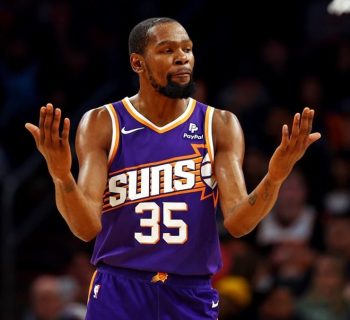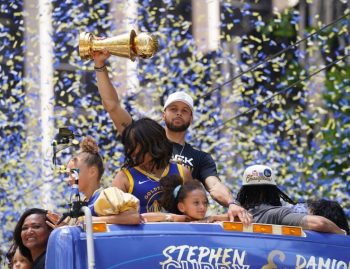NBA
NBA Daily: Biggest Disappointments — Northwest Division

A couple weeks ago, Basketball Insiders started a series looking over who were some of the biggest surprises so far in this young NBA season. This week, we’re changing it up a bit by taking a look at some of the biggest disappointments. To start this off, we’re looking at the Northwest Division.
It’s funny how over the last few years, the biggest disappointment coming out of that division, and possibly in the entire NBA, has been Andrew Wiggins. Wiggins’ odd regression over the last few years has made the NBA public lose their faith in him as a player, so much that, when this season started, he was seen as nothing but a young bust that Minnesota was burning oodles of cash to have on its roster.
It looks like Wiggins listened to the haters because he’s been playing like a man possessed this season. Averaging almost 25 points a game on 46 percent shooting from the field would qualify as career-highs for him. Even as a playmaker, he’s made some strides as his 3.1 assists at the present time is also a career-best. The Timberwolves have come down to earth since their hot start, but at least Andrew’s doing his part.
This is relevant to a certain degree. For a while now, the man they called “Maple Jordan” was called a disappointment because his career trajectory was falling — and falling fast. Now, it looks like he’s restored some of the hope he once had. Much like Wiggins over the last two years, the following disappointments in the Northwest have time to pick up the pieces, but for now, they have been rather underwhelming in these first three weeks.
The Nuggets’ Suddenly Unproductive Offense
It sounds weird, doesn’t it? The Nuggets currently sit at 7-2, they’ve beaten some good teams in the last week or so – Philadelphia and Miami – and last year, their offense was one of the best in the entire league. That was evidenced by them having the sixth-best offensive rating, scoring 113 points per 100 possessions.
It gets even weirder knowing that nothing really changed for the Nuggets over the summer roster-wise. The only noteworthy additions to this team were Jerami Grant and Michael Porter Jr. Those guys really shouldn’t make Denver worse – which they haven’t – and could still add another dimension to the team. Besides them, the Nuggets overall have the same construct they did last year, so what’s different?
In a nutshell, Nikola Jokic and Jamal Murray have not performed as well as they had been expected to. As a result, they now have the 23rd-ranked offense in the league, scoring 103.6 points per 100 possessions. In order to figure out how it got this way, we need to take a look at who’s responsible.
Let’s start with Nikola Jokic. In this ever so strange subplot of weird, it may be the weirdest to rag on the Joker considering he’s coming off of two consecutive buzzer beaters over the Nuggets’ last two games, but the point still stands- Jokic has not started the year off well.
In nine games, Jokic has averaged 16.7 points on 44/24/73 splits to go with 9.3 rebounds and 6 assists. When you compare those numbers to the ones he put up last year, a.k.a. the ones that got him All-NBA First Team Honors, that’s a drastic decline. Jokic at the top of his game is the most offensively polished big in the league. The Nuggets have managed to win in spite of his struggles, but they can’t expect to keep doing so if he can’t recapture the player he was last season.
Then, there’s Jamal Murray. Murray hasn’t really regressed, but he hasn’t shown much improvement since last season. Jamal was just given a fairly wealthy extension over the summer, so this lack of progress is a little troubling to watch.
Averaging 18.8 points on 45/37/85 splits are good numbers for a fourth-year player, but next year, Murray’s not going to be on a rookie contract. He’ll be making just a tick less than $30 million next season. Those are numbers you pay for a guy who can put up 25-30 on any given night. Jamal’s done that at times, but as yet to show extensive consistency.
The Nuggets still going at it strong because their defense has improved by a fair margin. Allowing 100.6 points per 100 possessions has made them good for the fourth-best defensive rating in the league. As disappointing as the offense has been, Denver has to be feeling good about its chances since the team’s still been able to win in spite of struggles.
CJ McCollum’s Regression
The Portland Trail Blazers altogether are kind of a mess right now — although it isn’t entirely their fault. Zach Collins’ shoulder injury just three games into the season is a massive blow to a team that was already pretty thin in the frontcourt. Besides Hassan Whiteside, they are relying on Skal Labissiere to give them minutes at the five.
To compensate for the departures of Al-Farouq Aminu and Maurice Harkless, they are relying on the likes of journeymen like Anthony Tolliver and Mario Hezonja to fill in at the three and four positions. The all-around downgrade in their frontcourt has definitely played a part in the team starting out 4-6.
Their struggles have come from the offensive end, as their offensive rating has gone from 114.7 (fourth overall last season) to 108.9 (11th currently). The new guys probably have something to do with that, but the biggest culprit might just be CJ McCollum’s slump.
McCollum’s still putting up solid numbers, averaging almost 20 points per game, but that’s coming on some of the worst percentages he’s put up since playing a larger role in Portland, putting up 39/31/89 splits. McCollum has the third-highest net rating on the team, as the Blazers are plus-12.4 with him on the court, but one can’t help if those stats are skewed from playing a lot of minutes with Damian Lillard, who is off to the best start of his career.
The duo shares a net rating of plus-7, but when you compare CJ’s net rating with some of his other teammates to Dame’s, they don’t look as promising.
CJ McCollum and Hassan Whiteside: plus-1.7
Damian Lillard and Hassan Whiteside: plus-6.4
CJ McCollum and Rodney Hood: plus-0.8
Damian Lillard and Rodney Hood: plus-6.4
CJ McCollum and Kent Bazemore: minus-2.9
Damian Lillard and Kent Bazemore: plus-1.9
CJ McCollum and Mario Hezonja: plus-5.6
Damian Lillard and Mario Hezonja: plus-10.1
Knowing McCollum’s reputation as a scorer, this should get better as time goes on, but how much time is what Portland has to keep in mind. The Western Conference has been unforgiving since the dawn of time, so if CJ and the Blazers continue to struggle, that can come back to bite them when they try to get good seeding in the playoffs.
Portland’s goal this season was to exceed last year’s extended playoff run. For that to come to fruition, they can’t afford to have their other elite scorer struggle from the field for too long.
Utah’s Continued Offensive Stagnancy
Yes, the theme of this has centered around offensive struggles, and yes, you can call this cheating since this writer brought up the Jazz’ woes on that end two weeks ago, but it’s still worth talking about because nothing has changed for Utah.
Three weeks into the season, they have the 27th-best offensive rating, scoring, 102.1 points per 100 possessions. It’s even worse remembering that last season, they had the 15th best offensive rating, scoring 110.9 points per 100 possessions. Their offense certainly got in the way of their playoff chances then, but at least it was mediocre as opposed to bad.
This writer doesn’t want to say what he’s already said about Utah’s continued woes on offense. Instead, let’s take a look at one of the Jazz’s big wins over the weekend against Milwaukee. Everyone should remember Bojan Bogdanovic’s one shining moment.
https://twitter.com/LegionHoops/status/1193027352831258624
Like any buzzer-beater, it’s always so thrilling to see plays like that happen. Not just because the Jazz beat a tough foe, but because it was such a beautifully drawn play to get arguably their best shooter wide open. So where do their offensive woes factor into this? Well, let’s take a look back at where the game was with 1:30 to go.
A Donovan Mitchell jumper put the Jazz up by eight with less than 90 seconds to go. Coming back from a three-possession game to win with that little time is near impossible. Yet, the Bucks were a Khris Middleton traveling call from pulling it off. They did this because Utah’s offense failed to put the game away.
In 88 seconds, missed free throws, costly turnovers and bad shots on Utah’s part got Milwaukee to close the gap. Not only had Utah lost the lead, but the team was also in jeopardy of losing the game. They may have won the game anyway, but they should not have been in danger of losing that game.
What’s more alarming is that the Jazz can’t afford to make those mental mistakes when facing opponents as tough as the Bucks. They won’t have to worry about facing Milwaukee in the playoffs unless they meet in the NBA Finals, but Utah’s going to have its hands full with other Western Conference competitors.
Like Denver, they’re still going strong regardless of their offensive woes, but they can’t have these problems if they want to go the distance.
Apologies if these disappointments all sounded the same, but honestly, there haven’t been that many disappointments in the Northwest Division. Utah and Denver are doing about as well as we thought they’d do. Minnesota is currently exceeding expectations. Oklahoma City is right where we thought they’d be. The only team that has somewhat disappointed is Portland, and that might not have been the case if Zach Collins wasn’t hurt — or Jusuf Nurkic for that matter.
And just because they’re disappointing now does not mean that will be the same by the time 2020 starts.
There’s still plenty of time for everyone’s outlook to change for the better. Just ask Andrew Wiggins.













